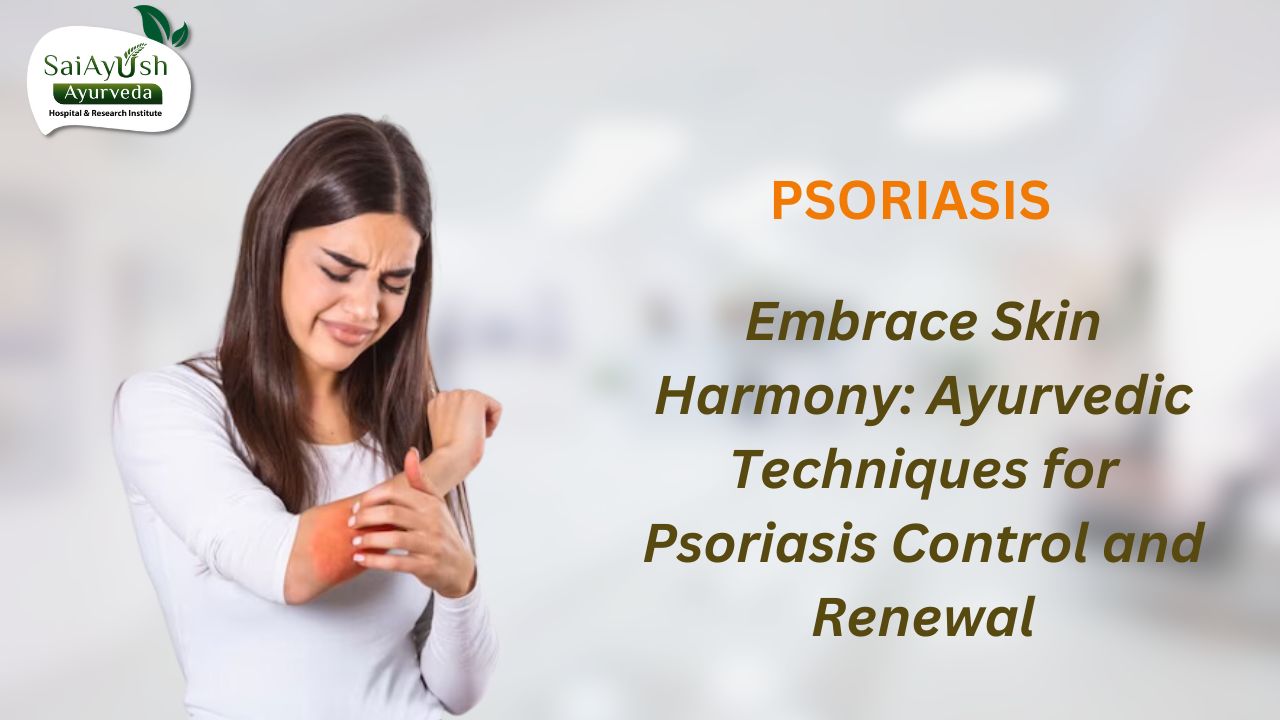Psoriasis is an ongoing autoimmune disorder that affects the skin. It causes the rapid buildup of skin cells, resulting in thick, red patches covered with silvery scales called plaques. These patches can be itchy, and painful, and may crack and bleed. Psoriasis may be brought on by hereditary and environmental factors, but the exact aetiology is unknown. People of any age can develop psoriasis.
Body parts that affect PSORIASIS Psoriasis can occur on any part of the body, but it most commonly affects the elbows, knees, trunk, and scalp.
Types of PSORIASIS:
There are several types of psoriasis, including plaque psoriasis (the most common form), guttate psoriasis, pustular psoriasis, inverse psoriasis, and erythrodermic psoriasis. Each type has unique traits and might call for a different approach to treatment. According to Ayurveda, psoriasis can be correlated to a type of kushta. The doshas involved in disease are vata, pitta, pitta and kapha dosas, but more vata and kazhta doshas
Causative factor of Psoriasis according to Ayurveda�
- Ayurveda views psoriasis as a result of impaired digestion and the accumulation of toxins (ama) in the body.
- Intake of virudhaahara (mutually contradictory foods) such as fish and milk products, intake of unctuous and heavy drinks, suppression of natural urges like vomiting, sleep, etc
- Intake of cold water immediately after exposure to extreme heat and sunlight
- Eating food before the previous meal gets digested�
- Excess intake of foods like fresh grains, curd, fish, salt, and sour substances�
These are some of the causative factors mentioned in Ayurveda. These cases ama in the body, aggravate doshas, and then manifest on the skin, leading to the characteristic symptoms of psoriasis.
Signs and symptoms of psoriasis
The signs and symptoms of psoriasis can vary from person to person, but here are some common manifestations:
- Red patches of skin: Psoriasis typically presents as red, inflamed patches of skin that may be covered with silver or white scales. These patches are known as plaques and commonly appear on the elbows, knees, scalp, and trunk.
- Dry, cracked skin: The affected areas may be dry, itchy, and prone to cracking. This can cause discomfort and pain, especially when the skin becomes irritated or breaks open.
- Scaling and flaking: One of the hallmark symptoms of psoriasis is the presence of thick, silvery scales on the skin. These scales can be shed, leading to flaking and the appearance of dandruff-like flakes.
- Itching and burning: Psoriasis patches can be intensely itchy, causing a strong urge to scratch. Scratching can worsen the condition and may lead to the development of open sores or bleeding.
- Nail changes:Psoriasis can also affect the nails, causing pitting (small depressions or dents), thickening, yellowing, or separation of the nail from the nail bed. In some cases, nails may become crumbly or develop ridges.
- Joint pain and swelling:Some people with psoriasis may experience joint pain, stiffness, and swelling, a condition known as psoriatic arthritis. It can affect any joint in the body and lead to reduced mobility and discomfort.
- Lesions in sensitive areas: Psoriasis can appear in areas with increased sensitivity, such as the genitals, armpits, or between the buttocks. These areas may develop smooth, red patches without the typical scaling.
It’s important to note that psoriasis is a chronic condition, which means that symptoms can come and go in cycles of flare-ups and remissions. The severity and extent of symptoms can vary widely, ranging from mild, localized patches to more widespread involvement of the skin. If you suspect you may have psoriasis, it’s recommended to consult a healthcare professional for an accurate diagnosis and appropriate treatment.
Ayurveda’s approach to the treatment of PSORIASIS
Treatment in Ayurveda focuses on restoring the balance of the doshas and eliminating toxins from the body. Here are some common Ayurvedic approaches for managing psoriasis:
- Panchakarma: This is a comprehensive detoxification and cleansing procedure that includes therapies like Vamana (therapeutic vomiting), Virechana (purgation), Basti (medicated enema), Nasya (nasal administration of herbal oils), and Rakta Moksha (bloodletting). Panchakarma aims to eliminate toxins and restore the body’s natural equilibrium.
- Herbal Remedies: Ayurvedic herbs with anti-inflammatory, detoxifying, and immunomodulatory properties are used in the treatment of psoriasis. Neem (Azadirachta indica), Manjistha (Rubia cordifolia), Turmeric (Curcuma longa), Guggulu (Commiphora mukul), Aloe vera, and Triphala (a combination of three fruits) are commonly prescribed herbs.
- Diet and lifestyle: Ayurveda places a strong emphasis on the importance of a healthy diet and way of life. It is recommended to avoid triggers like spicy, oily, and processed foods. Instead, include fresh fruits, vegetables, whole grains, and herbal teas in your diet. Regular exercise, stress management techniques (such as yoga and meditation), and adequate sleep are also beneficial.
- External Treatments: Ayurvedic therapies such as Abhyanga (oil massage), Swedana (herbal steam therapy), and Pinda Sweda (herbal bolus massage) can be used to nourish the skin, improve circulation, and reduce inflammation.
It’s important to note that Ayurvedic treatments should be undertaken under the guidance of a qualified Ayurvedic practitioner. The doctors of SAI AYUSH AYURVEDA will provide a treatment plan considering your unique body constitution, symptoms, and the root cause of the disease. We ensure the best treatment for our patients to help them lead a healthy life.
Discover the healing power of Ayurveda with our latest article at Sai Ayush Ayurveda Hospitals! Dive into the age-old wisdom that can rejuvenate your body and mind. Click here to read more:



0 Comments